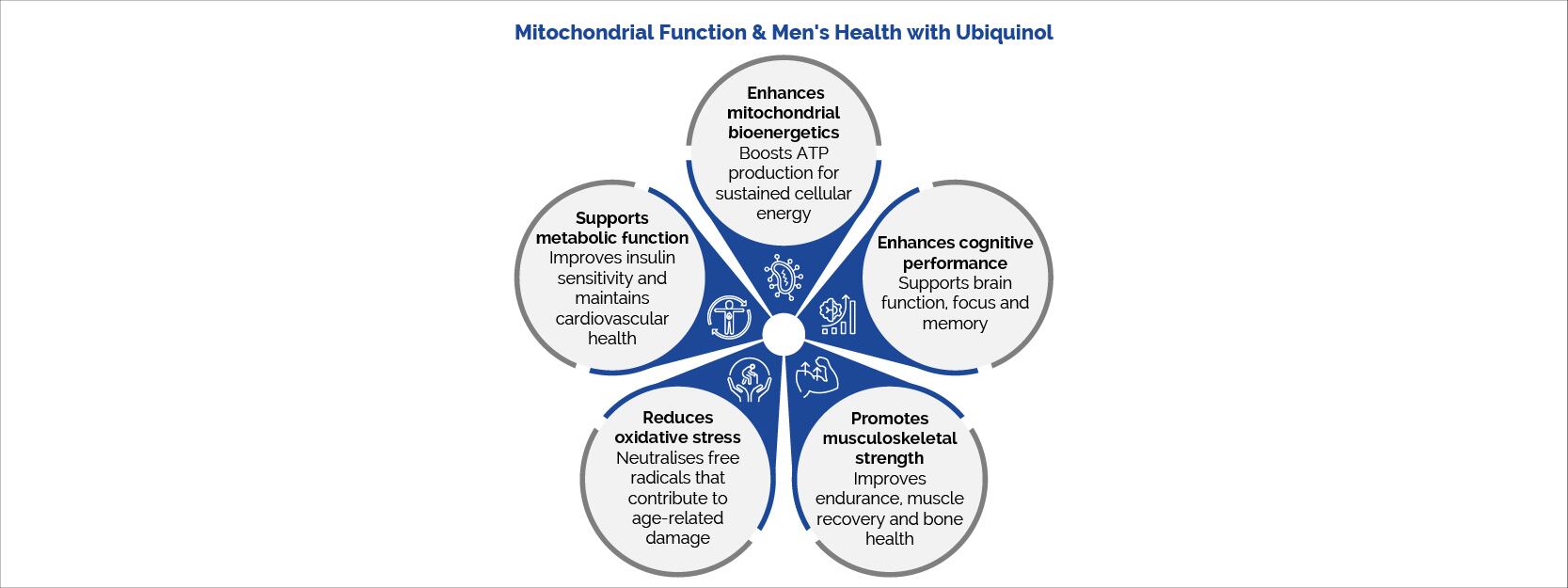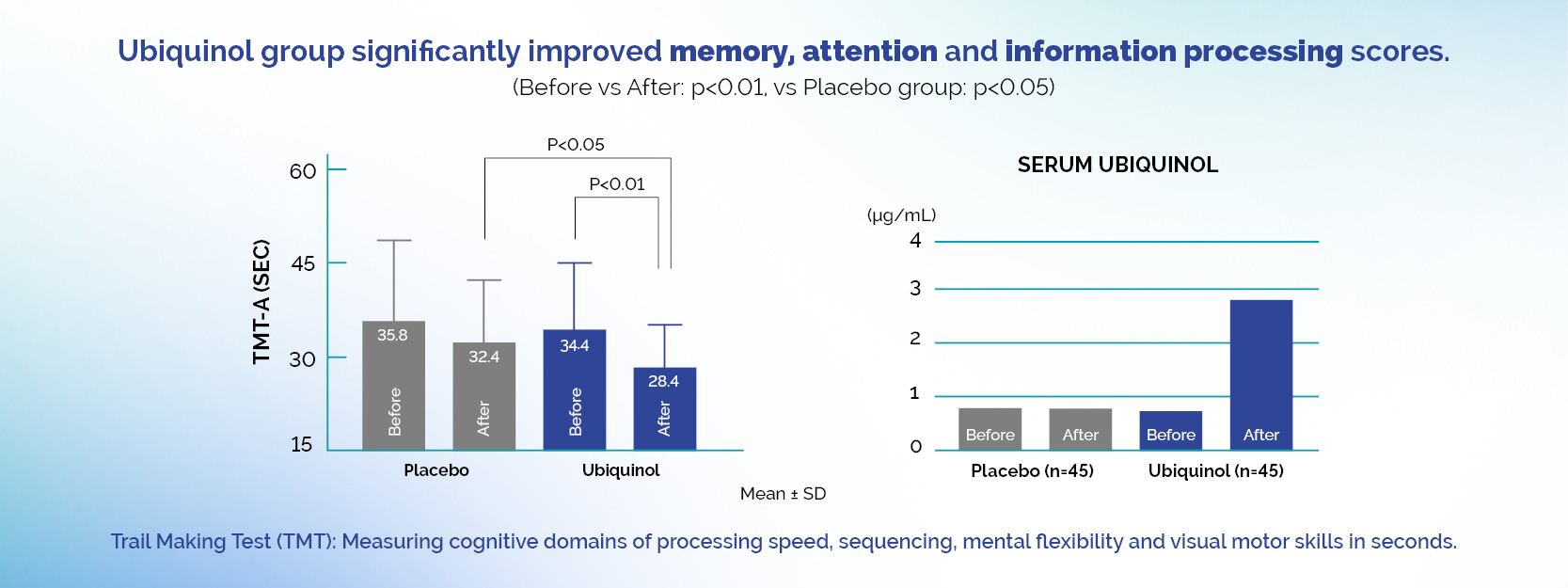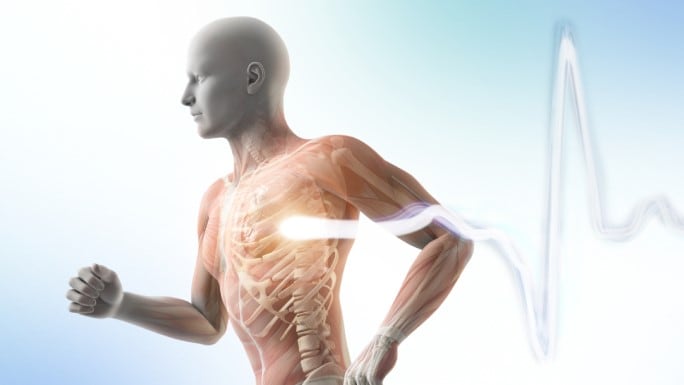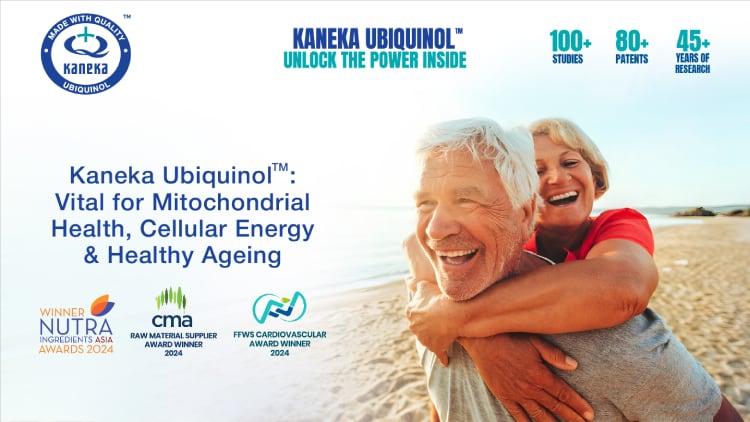Ubiquinol, the active, reduced form of coenzyme Q10, is a powerful antioxidant and an essential component of cellular energy production in the mitochondria of cells.
It plays a central role in energy/ATP synthesis, which fuels every physiological process in the body – from muscle contraction to cognition to cardiovascular output.
As we age, mitochondrial efficiency declines, particularly due to oxidative stress, inflammation and a reduction in the body’s ability to convert CoQ10 into ubiquinol.¹ By midlife, ubiquinol levels can drop by up to 50%, significantly impacting energy levels, cellular function and health.²⁻⁶
This makes ubiquinol supplementation an increasingly important strategy to maintain energy, vitality, performance and longevity, and research supports its use in many key health areas for men as they age.

The role of ubiquinol in men’s health and ageing
From early adulthood, men may begin to experience a gradual decline in energy levels, muscle mass, cognitive clarity and cardiovascular resilience – often worsened by lifestyle stress, poor sleep and metabolic challenges.
Ubiquinol addresses these interrelated concerns by supporting mitochondrial function, which underpins energy production, hormone regulation and cellular protection across all body systems.
Energy and vitality
Energy loss is one of the most common complaints among men over 40.⁷ Ubiquinol supplementation (100-150 mg/day) has been shown to reduce both mental and physical fatigue by enhancing mitochondrial ATP production and reducing oxidative stress.⁸⁻¹¹ Clinical research demonstrates that it improves vitality in healthy individuals and those with chronic fatigue, particularly when used long-term.⁹
Exercise endurance and muscle recovery
Men engaged in fitness or physical work benefit from ubiquinol’s ability to support performance and speed up recovery. Doses of 100-300 mg/day improve peak power output, reduce oxidative damage in muscles and accelerate heart rate recovery post-exercise.
This is achieved through the preservation of nitric oxide (NO) levels and enhanced antioxidant capacity in muscle tissue, resulting in less soreness and quicker regeneration.¹¹⁻¹⁸ For older men, this means maintaining lean muscle mass, strength and mobility well into later life.
Bone and musculoskeletal health
Age-related loss of bone density and muscle strength increases fracture risk and decreases mobility. Ubiquinol (200 mg/day) has been shown to support bone turnover and enhance bone formation biomarkers, particularly during periods of intense physical activity.¹⁹
Stress and sleep support
Men under chronic stress or with demanding lifestyles often experience sleep disturbances and mood instability. Ubiquinol has been shown to improve subjective stress levels, physical stress symptoms and sleep quality with 100 mg/day – key factors for maintaining mental health.²⁰⁻²¹
Cognitive and mental performance
With age, men may notice reduced focus, memory lapses and slower information processing. Using 100 mg/day of ubiquinol has shown significant improvements in cognitive performance, particularly memory, attention and reaction times. These benefits are linked to enhanced brain energy metabolism and reduced oxidative stress in neural tissue.²²

Cardiovascular function
Men aged 40 and above can be at increasing risk of hypertension, vascular stiffness and cardiac dysfunction.²³ Ubiquinol’s cardioprotective effects are well documented for support in these areas:
- 100-600 mg/day decreases oxidative stress and improves myocardial levels, supporting cardiovascular health.²⁴⁻³⁰
- In hypertensive men, 100-200 mg/day of ubiquinol helps lower systolic and diastolic blood pressure.³¹⁻³²
- For those with dyslipidaemia, 100-200 mg/day assists to reduce LDL oxidation.²⁶⁻³³
This makes ubiquinol particularly relevant in men’s cardiovascular formulations, whether as a standalone or part of a complex.
Fertility and sperm health
Oxidative stress is a key driver of sperm dysfunction. In men aged 30-55 undergoing fertility treatment, ubiquinol (150–400 mg/day) significantly improved:³⁸⁻⁴²
- Sperm count by 53%
- Motility by 26%
- Morphology, yielding better fertilisation outcomes
Longer durations and higher doses correlate with improved pregnancy rates, highlighting ubiquinol as a vital antioxidant for reproductive age men and those trying to conceive.
Dietary decline and the need for supplementation
Natural dietary sources of ubiquinol are limited – found only in small amounts in meat and fish – and even these levels may be inadequate for ageing individuals, particularly those on plant-based diets, where levels are around 23% lower.⁴³ The body’s ability to produce ubiquinol also becomes less efficient with age, making supplementation the most effective way to restore optimal levels.¹
Kaneka Ubiquinol™ is the only patented, bioidentical ubiquinol produced via yeast fermentation with over 100 clinical studies and 45+ years of research, with robust evidence for multiple indications across men’s health.
Consumer trends and product opportunities
There is growing consumer interest in energy supplements, anti-ageing solutions and men’s wellness products. Men are increasingly seeking evidence-based, high-quality supplements to support active, healthy ageing – particularly in areas of stamina, cognitive clarity, stress resilience and cardiovascular health.
Search data, sales trends and practitioner demand all point to Kaneka Ubiquinol as a premium ingredient with strong traction in the active ageing space. Kaneka Ubiquinol aligns with top consumer drivers:
- Energy and fatigue reduction
- Cognitive health and focus
- Heart and vascular support
- Exercise recovery and vitality
Kaneka Ubiquinol is an ideal hero ingredient for men’s health formulations – from daily vitality complexes and cardiovascular blends to recovery powders and cognitive support stacks.
High-performance supplementation
Ubiquinol offers companies a unique opportunity to create high-performance supplements that align with both science and consumer demand. Incorporating clinically validated Kaneka Ubiquinol into men’s health products, can not only help to differentiate products but also build trust with today’s health-savvy male consumer.
Find out more information about Kaneka Ubiquinol here, or email at hello@ubiquinol.net.au.
*Always read the label and follow the directions for use. Consult your healthcare professional to establish if ubiquinol is suitable for your needs.*
References
- Wada, H.; et al. Redox status of coenzyme Q10 is associated with chronological age. JAGS. 2007; 55:1141-1142.
- Kalén, A.; et al. Age-related changes in the lipid compositions of rat and human tissues. Lipids 1989;24(7):579-584.
- Aberg, F.; et al. Distribution and redox state of ubiquinones in rat and human tissues. Arch Biochem Biophys 1992;295(2):230-234.
- Littarru, G.P.; et al. Human tissue CoQ10 content relies on both endogenous biosynthesis and exogenous, dietary, supply. Metabolic and diagnostic implications of blood CoQ10 levels. In: Folkers K, et al (eds). Biomedical and Clinical Aspects of Coenzyme Q. Elsevier Science 1991, Amsterdam:167-178.
- Fernández-Ayala, D.J.M.; et al. Invertebrate models for coenzyme q10 deficiency. Mol Syndromol 2014;5(3-4):170-179.
- Okamoto, T.; et al, Human serum ubiquinol-10 levels and relationship to serum lipids. Int J Vitam Nutr Res 1989;59(3):288-292.
- Lin, W.Q.; et al. Factors associated with fatigue among men aged 45 and older: A cross-sectional study. Int J Environ Res Public Health 2015;12(9):10897-10909.
- Mizuno, K.; et al. Ubiquinol-10 intake is effective in relieving mild fatigue in healthy individuals. Nutrients 2020;12(6):1640.
- Fukuda, S.; et al. Ubiquinol-10 supplementation improves autonomic nervous function and cognitive function in chronic fatigue syndrome. Biofactors 2016;42(4):431-440.
- Tsai, I.C.; et al. Effectiveness of coenzyme Q10 supplementation for reducing fatigue: A systematic review and meta-analysis of randomized controlled trials. Front Pharmacol 2022;13:883251.
- Chen, H.C.; et al. Ubiquinol supplementation alters exercise induced fatigue by increasing lipid utilization in mice. Nutrients 2019;11(11):2550.
- Alf, D.; et al. Ubiquinol supplementation enhances peak power production in trained athletes: a double-blind, placebo controlled study. J Int Soc Sports Nutr 2013;10:24.
- Moreno-Fernandez, J.; et al. Ubiquinol short-term supplementation prior to strenuous exercise improves physical performance and diminishes muscle damage. Antioxidants (Basel) 2023;12(6):1193.
- Sánchez-Cuesta, A.; et al. High coenzyme Q10 plasma levels improve stress and damage markers in professional soccer players during competition. Int J Vitam Nutr Res 2022;92(3-4):192-203.
- Suzuki, Y.; et al. Short-term ubiquinol-10 supplementation alleviates tissue damage in muscle and fatigue caused by strenuous exercise in male distance runners. Int J Vitam Nutr Res 2021;91(3-4):261-270.
- Sarmiento, A.; et al. Short-term Ubiquinol supplementation reduces oxidative stress associated with strenuous exercise in healthy adults: A randomized trial. Biofactors 2016;42(6):612-622.
- Orlando, P.; et al. Effect of ubiquinol supplementation on biochemical and oxidative stress indexes after intense exercise in young athletes. Redox Rep 2018;23(1):136-145.
- Kunching, S.; et al. The effects of ubiquinol supplementation on clinical parameters and physical performance of trained men. Songklanakarin J Sci Technol (SJST) 2022;44(1):231-235.
- Diaz-Castro, J.; et al. Ubiquinol supplementation modulates energy metabolism and bone turnover during high intensity exercise. Food Funct 2020;11(9):7523-7531.
- Morikawa, H.; et al. Reduced form of coenzyme Q10 relieves daily life stress and improves sleep quality in healthy subjects with high stress sensitivity-a randomized, double-blind, parallel-group study. Jpn Pharmacol Ther 2019;57(8):1231-1244.
- Kawaharada, Y.; et al. Usefulness of regular intake of the reduced form of CoQ10 for stress management for workers. Jpn Pharmacol Ther 2013; 41:1129-1137.
- Kinoshita, T.; et al. The effects of ubiquinol (reduced form of coenzyme Q10) on memory, attentiveness, and work processing ability in healthy middled-aged and elderly residents – A randomized, double-blind, placebo-controlled trial. Jpn Pharmacol Ther 2021;49:1739-1747.
- Heart Foundation. Key statistics: Risk factors for cardiovascular disease. National Heart Foundation of Australia 2025.
- Pérez-Sánchez, C.; et al. Ubiquinol effects on antiphospholipid syndrome prothrombotic profile: A randomized, placebo-controlled trial. Arterioscler Thromb Vasc Biol 2017;37(10):1923-1932.
- Ali, S.H.; et al. Influence of ubiquinol on angina severity and dyspnea in patients with acute coronary syndrome. J Popul Ther Clin Pharmacol 2023;30(13):e405-e414.
- Sabbatinelli, J.; et al. Ubiquinol ameliorates endothelial dysfunction in subjects with mild-to-moderate dyslipidemia: A randomized clinical trial. Nutrients 2020;12(4):1098.
- Onur, S.; et al. Association between serum level of ubiquinol and NT-proBNP, a marker for chronic heart failure, in healthy elderly subjects. Biofactors 2015;41(1):35-43.
- Kawashima, C.; et al. Ubiquinol improves endothelial function in patients with heart failure with reduced ejection fraction: A single-center, randomized double-blind placebo-controlled crossover pilot study. Am J Cardiovasc Drugs 2020;20(4):363-372.
- Pierce, J.D.; et al. Effects of Ubiquinol and/or D-ribose in patients with heart failure with preserved ejection fraction. Am J Cardiol 2022;176:79-88.
- Bates, A.; et al. Myocardial energetics and ubiquinol in diastolic heart failure. Nurs Health Sci 2014;16(4):428-33.
- Zhao, D.; et al. Dose-response effect of coenzyme Q10 supplementation on blood pressure among patients with cardiometabolic disorders: a grading of recommendations assessment, development, and evaluation (GRADE)-assessed systematic review and meta-analysis of randomized controlled trials. Adv Nutr 2022;13(6):2180-2194.
- Rosenfeldt, F.L.; et al. Coenzyme Q10 in the treatment of hypertension: a meta-analysis of the clinical trials. J Human Hypertension 2007;21(4):297-306.
- Rabanal-Ruiz, Y.; et al. The use of coenzyme Q10 in cardiovascular diseases. Antioxidants (Basel) 2021;10(5):755.
- Zlatohlavek, L.; et al. The effect of coenzyme Q10 in statin myopathy. Neuro Endocrinol Lett 2012;33 Suppl 2:98-101.
- Vaughan, R.A.; et al. Ubiquinol rescues simvastatin-suppression of mitochondrial content, function and metabolism: implications for statin-induced rhabdomyolysis. Eur J Pharmacol 2013;711(1-3):1-9.
- Langsjoen, P.H.; et al. Statin-associated cardiomyopathy responds to statin withdrawal and administration of coenzyme Q10. Perm J 2019;23:18-257.
- Kloer, H.U.; et al. Combining Ubiquinol with a statin may benefit hypercholesterolaemic patients with chronic heart failure. Heart Lung Circ 2020;29(2):188-195.
- Safarinejad, M.R.; et al. Effects of the reduced form of coenzyme Q10 (Ubiquinol) on semen parameters in men with idiopathic infertility: A double-blind, placebo controlled, randomized study. J Urol 2012;188(2):526-531.
- Thakur, A.S.; et al. Effect of ubiquinol therapy on sperm parameters and serum testosterone levels in oligoasthenozoospermic infertile men. J Clin Diagn Res 2015;9(9):BC01-03.
- Cakiroglu, B.; et al. Ubiquinol effect on sperm parameters in subfertile men who have astheno-teratozoospermia with normal sperm concentration. Nephrourol Mon 2014;6(3):e16870.
- Alahmar, A.T.; Naemi R. Predictors of pregnancy and time to pregnancy in infertile men with idiopathic oligoasthenospermia pre- and post-coenzyme Q10 therapy. Andrologia 2022;54(5):e14385.
- Li, K.P.; et al. The effect of antioxidants on sperm quality parameters and pregnancy rates for idiopathic male infertility: A network meta-analysis of randomized controlled trials. Front Endocrinol (Lausanne) 2022;13:810242.
- Yamaguchi, T.; et al. Lower plasma coenzyme Q10 concentrations in healthy vegetarians and vegans compared with omnivores. Nutrafoods 2022(1):379-386.







